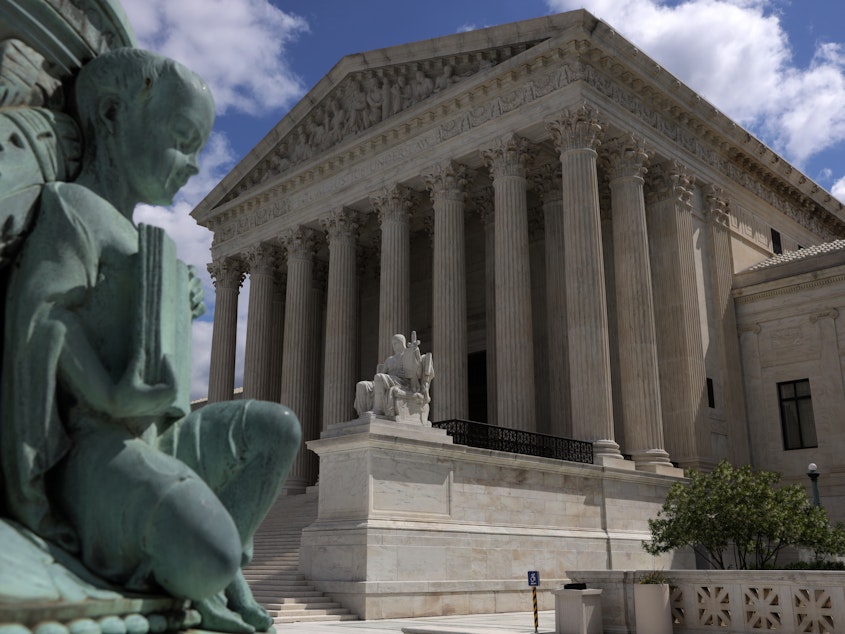The Supreme Court marshal leading the leak investigation is a career Army lawyer

While the public continues processing the contents of the leaked draft opinion overturning Roe v. Wade, the Supreme Court is trying to figure out how it got out in the first place.
Chief Justice John Roberts stressed in a Tuesday statement that the draft opinion does not represent the court's final decision. He called the leak a "betrayal of the confidences of the court" but vowed that its work will not be affected in any way.
"This was a singular and egregious breach of that trust that is an affront to the Court and the community of public servants who work here," he said, adding that he had directed the marshal of the court to launch an investigation into the source of the leak.
The duties of the Supreme Court marshal typically include handling security for the building and the justices (in addition to announcing the justices' entrance into the chambers with the famous call of "Oyez, Oyez, Oyez!").
Col. Gail Curley, a former U.S. Army attorney, has served as the court's marshal since June 2021. Now she's tasked with finding the source of one of the biggest leaks in modern Supreme Court history — even though it doesn't appear to involve any sort of crime.
Sponsored
Here's what we know about Curley.
She's the second woman to ever hold this position
Curley's appointment was announced by the Supreme Court on May 3, 2021 — exactly one year before she was charged with solving one of its highest-profile mysteries.
She replaced Pamela Talkin, who had retired the previous year after nearly two decades in the role, which she was the first woman to hold. Curley is the 11th marshal of the Supreme Court since the position was created in 1867.
The court describes her role as its "chief security officer, facilities administrator and contracting executive." She is charged with calling the court to order in argument sessions, maintaining order during proceedings and managing some 260 employees — including the Supreme Court Police Force, which protects the court's grounds, justices, employees, visitors and guests.
Sponsored
She's a career Army lawyer who has served overseas
The West Point graduate holds a law degree from the University of Illinois, as well as two masters degrees from The Judge Advocate General's Legal Center and School and the Dwight D. Eisenhower School for National Security and Resource Strategy.
Curley held a variety of legal positions throughout her Army career. From 2016 to 2019 she was the staff judge advocate for the U.S. Army Europe headquarters in Wiesbaden, Germany. In that capacity, she "served as the senior U.S. Army attorney for an area consisting of 50 nations and supervised over 300 legal professionals," the court said.
Her most recent job was as the chief of the National Security Law Division in the Office of the Judge Advocate General.
"She supervised a team of judge advocates, led the strategic engagements program for the Judge Advocate General's Corps, and provided legal advice and support on national security law to senior Army leadership," the court explains.
Sponsored
She has the authority to make certain arrests
According to Bloomberg Law, the marshal and Supreme Court police have the authority to make arrests for violations of state or federal law while providing security — but in the case of this leak, any potential decision on prosecution most likely would come from the Justice Department.
Republican members of the House Oversight Committee sent a letter to the Justice Department on Tuesday requesting an investigation into the leak, according to Axios. The Justice Department declined to comment on the matter when asked by NPR on Tuesday.
Republican lawmakers have largely sidestepped questions about the impact the possible ruling could have, instead focusing on the leak itself, as NPR has reported. Senate Minority Leader Mitch McConnell said Tuesday that the leak — rather than the substance of the opinion — was the big story of the day.
As NPR justice correspondent Carrie Johnson says, prosecution looks unlikely: "This is not a national security issue, this is not classified information, so it doesn't seem like there's any crime here."
Sponsored
This story originally appeared in the Morning Edition live blog. [Copyright 2022 NPR]

